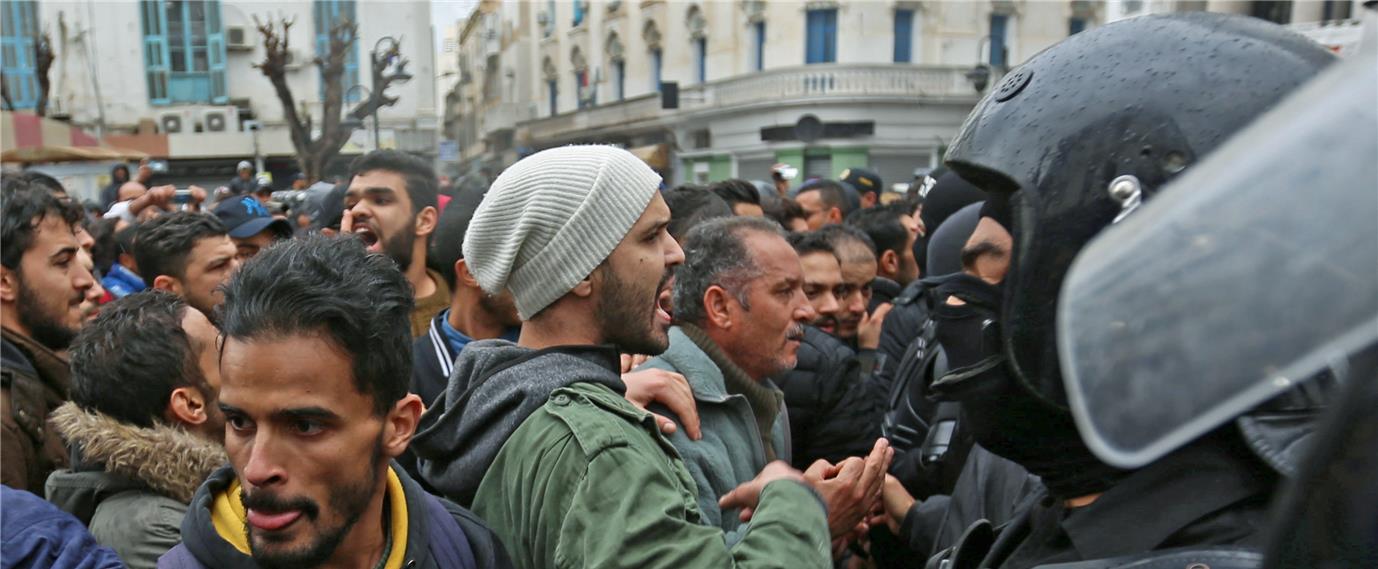وجهت التحركات الأخيرة في تونس أنظار وسائل الإعلام سواء المحلية أو الأجنبية إليها لتسارع المواقع الإخبارية والصحف والتلفزيونات إلى التغطية، لكن الملفت أن طريقة تقديم المعلومة اتسمت باختلاف واضح وتباين في رؤية الميديا نفسها للحدث.
وقد ثبت ذلك من خلال تغير سياقات تتبع وإذاعة الخبر من وسيلة إعلام إلى أخرى، سواء داخل أو خارج تونس.
محددات نقل المعلومة في ظل الحراك الشعبي
في ظل الحراك الاجتماعي الذي تعيشه تونس وتعدد الروايات حوله في بعض وسائل الإعلام، سارعت نقابة الصحفيين التونسيين إلى التعجيل بإصدار بيان دعت فيه الصحفيين إلى مراعاة حق الجمهور في معلومة دقيقة، ردا على برنامج "75 دقيقة"، عرض على القناة الوطنية الأولى وكان فيه توجيه صريح لصالح الحكومة حسب محدثنا عن نقابة الصحفيين محمد اليوسفي.
"أشرنا في البيان إلى الدور الكبير الذي يقوم به الإعلام في التأثير على الرأي العام، وانطلاقا من ذلك لا بد أن يعي كل صحفي بجملة المبادئ الأخلاقية للمهنة ويحترم ميثاق الشرف المهني، حتى لا يقع في توجيه الرأي العام أو يبتعد عن لب الحدث الرئيس وهو الاحتجاجات، ويركز على هوامش جانبية وهي أعمال العنف.. لاحظنا نسبيا ارتباكا وانزلاقات من بعض وسائل الإعلام ونبهنا إلى ضرورة اعتماد محدد لمقاربة شمولية تقوم على التوازن والتفسير للرأي العام، وليس التوجيه ومحاولة تغليب طرف على أخر" وبرَّر مضمون البيان بأن "الإعلام العمومي ممول من ضرائب التونسيين، لذلك نريد أن ينتصر هذا الإعلام لقضايا الشعب ويحترم أخلاقيات المهنة..".
وحول محاولات البعض التأثير على المضامين الإعلامية بوسائل مختلفة ولغايات عدة، يقول اليوسفي "ما يعزز مخاوفنا أننا بتنا نرى بعض الأطراف الحكومية تسعى لاستمالة وسائل الإعلام لتؤثر في مضامينها، كما تستغل العامل الاقتصادي لوسائل الإعلام الخاصة لتكون أقرب للسلطة؛ فنحن نريد إعلاما ديمقراطيا يحترم مبادئ وأخلاقيات العمل الصحفي، لا إعلاما بقبضة السلطة مثل العهد البائد".
صورة الحراك بين النقل الدقيق والتأويل
بين النقل الدقيق للخبر منذ بدايته وذكر خلفياته ومسبباته، وبين قولبة الصورة وتوجيهها بما يتلاءم ومصالح البعض، تراوحت مجهودات القائمين على تغطية التحركات الشعبية التي قامت منذ أيام في بعض المحافظات التونسية تنديدا بغلاء المعيشة وارتفاع الأسعار ورفضا لقانون المالية لسنة 2018.
لذلك يبقى توخي الحذر وتجنب السقوط في فخ التهويل الخبري للاحتجاجات، بالتقليل من حجمها والانصراف عن ذكر أسبابها أو التركيز على خطاب إعلامي يبخسها، يعد واجب وميزة الصحفي المحترف، خاصة عندما تكون الأجواء مشحونة باحتقان شعبي وتحركات غاضبة.. هذا ما أشارت إليه يسرا الشيخاوي، الصحفية المحررة في موقع حقائق أون لاين.
وتحدثت يسرا عن آلية الموقع الإخباري "حقائق أون لاين" في تغطية الأحداث بدقة، خاصة في ظل دخول الإعلام الجديد والصفحات غير الموثوقة على خط الأخبار والنقل.. "انطلقنا منذ البداية في عملنا كصحفيين ناقلين للحملة التي انتشرت على مواقع التواصل، والتي حملت وسم "فاش نستناو" (أي ماذا ننتظر؟). كمؤسسة إخبارية نقلنا العناوين الكبرى للحملة في قالب خبري ينبني على الدقة والموضوعية دون انحياز ولا تشويه للحقيقة، قبل أن يبدأ الناشطون المطلقون للحملة في تعبئة وحشد المتظاهرين وتحويلها من صفحات الافتراض إلى الشارع التونسي، حينها لم نتوقف عن ممارسة عملنا في النقل وتركيز عين المشاهد على ما يحصل من أحداث لحظة بلحظة، حتى أننا واكبنا جملة الاعتقالات التي حدثت أثناء الحراك الليلي الذي صاحبه أعمال نهب.. وفي كل مرة كنا نحرص أن يأتينا مصورنا الخاص بصور حديثة وفيديوهات دقيقة من قلب الميدان، ندلو بها في تقاريرنا".
وعن تباين الاختلاف في التغطية الإعلامية واختلاف التسميات الخبرية لما يدور على الساحة المجتمعية في تونس تضيف يسرا، "سمينا الأشياء بمسمياتها ولم نسقط في فخ التهويل الإعلامي أو التعتيم.. ومراعاة لمبدأ تحري الأخبار والتدقيق، كنا نتصل بمسئولين عن حملة فاش نستناو وأيضا بأحد المسؤولين بوزارة الداخلية أو بالناطق الرسمي باسم الأمن العمومي، على عكس بعض وسائل الإعلام وبعض الصفحات التي تغالط الرأي العام إما بإعادة نشر صور وفيديوهات لأحداث عنف قديمة أو بتوجيه الأنظار وتركيزها على أعمال الشغب والعنف بطريقة طمست المطالب الأصلية للتحركات الشعبية.. أنا كصحفية أدين العنف والتخريب لكن دون الحياد والانصراف عن الحدث الرئيسي المتمثل في التنديد بارتفاع الأسعار طبقا لنظرية ترتيب الأولويات الاحتجاج ضد غلاء المعيشة في المرتبة الأولى لتغطيتنا ومن ثم الحديث عن أعمال العنف والتخريب للحفاظ على المصداقية في واجبنا الإخباري". وختمت يسرا كلامها بالقول إن "الميديا الجديدة التي لا تخضع لرقابة هي التي تساهم في مرحلة أولى في بث الشائعات والمغالطات".
لم يختلف رأي وسام الدعاسي عن رأي زميلته، وهو مراسل التلفزيون العربي في تونس وسام، إذ يقول إنه "في تغطيتنا الميدانية، كنا نعي جيدا حجم المسؤولية التي على عاتقنا باعتبار أننا قناة تبث للمشاهد العربي وليس التونسي فقط، نعلم أن التعامل مع الأحداث الحساسة التي من شأنها أن تغير مجرى الخارطة السياسية، يجب أن يكون تعاملا حذرا ومسؤولا ويحترم أسس المهنية، لذلك اعتمدنا فكرة التركيز على الكلمات بدقة وحاولنا لأقصى حد توصيف الأشياء بأوصافها.. فهناك من يكرر لفظ احتجاجات واحتقان وهناك من يصفها فقط بأعمال العنف والتخريب". مضيفا "كنا متفطنين لنقل أي مستجد على الساحة دون أن نتبنى أي موقف ولا حتى استشراف ما يمكن أن تؤول إليه الأوضاع". ويشرح الدعاسي طريقتهم في تناول الأحداث بأن القناة قد تحدثت مع الأطراف الحزبية ومع الجهات الرسمية لكن دون ترك مساحة للتحليلات والتنبؤات، فهناك تضارب في الأقوال بين من يؤكد أن الوضع تحت السيطرة أو أن الحراك سيقود إلى ثورة.
وعن التعامل مع المعلومات المنتشرة على مواقع التواصل الاجتماعي، فيقول الدعاسي إنهم تجنبوا التعامل معها، أو كانوا ينطلقون من بعض المعلومات بنيّة التحري والتحقق منها أولا، مثل خبر نشر قوات عسكرية في المنشآت العمومية الذي نشر على هذه المواقع.. "لكننا لم نعتمده كخبر إلا بعد التواصل مع الناطق الرسمي لوزارة الدفاع الذي أكده".
من ناحية أخرى، يشير الدعاسي إلى العوامل التي انطلقوا منها لتفسير المشهد كاملا للمواطن العربي، وهي الوقت الذي تنطلق فيه الاحتجاجات، إذ كانت ليلية وهو أمر لم تشهده تونس من قبل، ثم تحولها لأعمال عنف، إضافة للدلالة الزمنية للأحداث، خاصة أن شهر يناير اكتسب دلالة مرتبطة بالتحركات والانتفاضات في العهد البورقيبي، إثر قيام ثورة الخبز في يناير/كانون الثاني، ثم في عهد بن علي عام 2008 وأخيرا الثورة التونسية عام 2011، والتي كانت في شهر يناير أيضا".








































